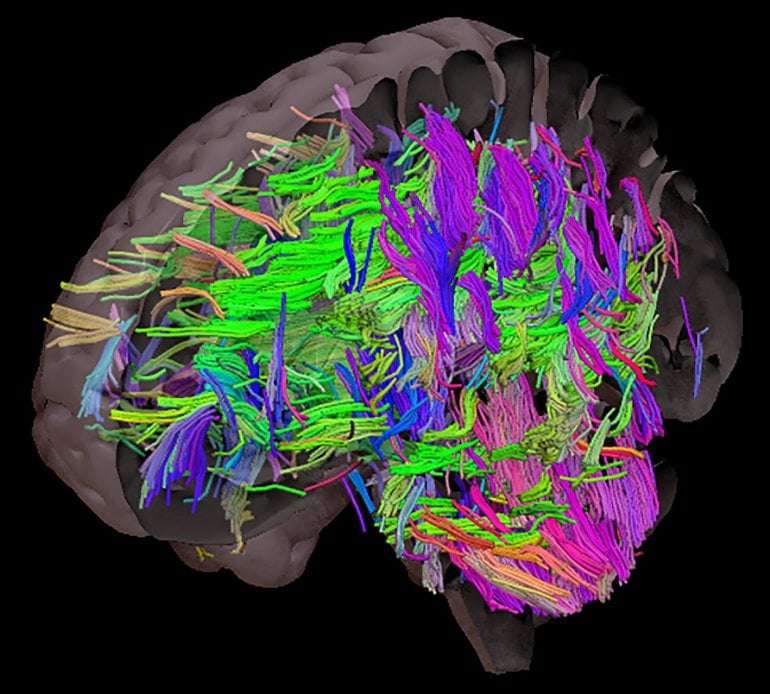Summary: Neuroimaging study reveals obesity may contribute towards neural tissue vulnerability in Alzheimer’s disease. Researchers say maintaining a healthy weight could help preserve brain structure for those in the early stages of Alzheimer’s.
Source: University of Sheffield
New research from the University of Sheffield has found being overweight is an additional burden on brain health and it may exacerbate Alzheimer’s disease.
The pioneering multimodal neuroimaging study revealed obesity may contribute toward neural tissue vulnerability, whilst maintaining a healthy weight in mild Alzheimer’s disease dementia could help to preserve brain structure.
The findings, published in The Journal of Alzheimer’s Disease Reports, also highlight the impact being overweight in mid-life could have on brain health in older age.
Lead author of the study, Professor Annalena Venneri from the University of Sheffield’s Neuroscience Institute and NIHR Sheffield Biomedical Research Centre, said: “More than 50 million people are thought to be living with Alzheimer’s disease and despite decades of ground breaking studies and a huge global research effort we still don’t have a cure for this cruel disease.
“Prevention plays such an important role in the fight against the disease. It is important to stress this study does not show that obesity causes Alzheimer’s, but what it does show is that being overweight is an additional burden on brain health and it may exacerbate the disease.”
She added:”The diseases that cause dementia such as Alzheimer’s and vascular dementia lurk in the background for many years, so waiting until your 60s to lose weight is too late. We need to start thinking about brain health and preventing these diseases much earlier. Educating children and adolescents about the burden being overweight has on multimorbidities including neurodegenerative diseases is vital.”
Researchers from the University of Sheffield and the University of Eastern Finland examined MRI brain scans from 47 patients clinically diagnosed with mild Alzheimer’s disease dementia, 68 patients with mild cognitive impairment, and 57 cognitively healthy individuals.
The novel study used three complementary, computational techniques to look at the anatomy of the brain, blood flow and also the fibres of the brain.
The international team compared multiple brain images and measured differences in local concentrations of brain tissues to assess grey matter volume – which degenerates during the onset of Alzheimers – white matter integrity, cerebral blood flow and obesity.
In mild dementia patients, a positive association was found between obesity and grey matter volume around the right temporoparietal junction. This suggests obesity might contribute toward neural vulnerability in cognitively healthy individuals and those with mild cognitive impairment.
The study also found that maintaining a healthy weight in mild Alzheimer’s disease dementia could help preserve brain structure in the presence of age and disease-related weight loss.
Joint author of the study, Dr Matteo De Marco from the University of Sheffield’s Neuroscience Institute, said: “Weight-loss is commonly one of the first symptoms in the early stages of Alzheimer’s disease as people forget to eat or begin to snack on easy-to-grab foods like biscuits or crisps, in place of more nutritional meals.

“We found that maintaining a healthy weight could help preserve brain structure in people who are already experiencing mild Alzheimer’s disease dementia. Unlike other diseases such as cardiovascular disease or diabetes, people don’t often think about the importance of nutrition in relation to neurological conditions, but these findings show it can help to preserve brain structure.”
The study was conducted in collaboration with the University of Eastern Finland. Professor Hilkka Soininen, joint author of the paper said: “The results emphasize different perspectives on lifestyle and nutrition in the prevention and treatment of Alzheimer’s disease. It’s important to avoid obesity for brain health, but for patients with Alzheimer’s disease, it is essential to take care of proper nutrition and maintain a healthy weight.”
About this Alzheimer’s disease research news
Source: University of Sheffield
Contact: Amy Huxtable – University of Sheffield
Image: The image is credited to University of Sheffield
Original Research: Open access.
“Obesity and Brain Vulnerability in Normal and Abnormal Aging: A Multimodal MRI Study” by Annalena Venneri et al. Journal of Alzheimer’s Disease Reports
Background:
How the relationship between obesity and MRI-defined neural properties varies across distinct stages of cognitive impairment due to Alzheimer’s disease is unclear.
Objective:
We used multimodal neuroimaging to clarify this relationship.
Methods:
Scans were acquired from 47 patients clinically diagnosed with mild Alzheimer’s disease dementia, 68 patients with mild cognitive impairment, and 57 cognitively healthy individuals. Voxel-wise associations were run between maps of gray matter volume, white matter integrity, and cerebral blood flow, and global/visceral obesity.
Results:
Negative associations were found in cognitively healthy individuals between obesity and white matter integrity and cerebral blood flow of temporo-parietal regions. In mild cognitive impairment, negative associations emerged in frontal, temporal, and brainstem regions. In mild dementia, a positive association was found between obesity and gray matter volume around the right temporoparietal junction.
Conclusion:
Obesity might contribute toward neural tissue vulnerability in cognitively healthy individuals and mild cognitive impairment, while a healthy weight in mild Alzheimer’s disease dementia could help preserve brain structure in the presence of age and disease-related weight loss.






